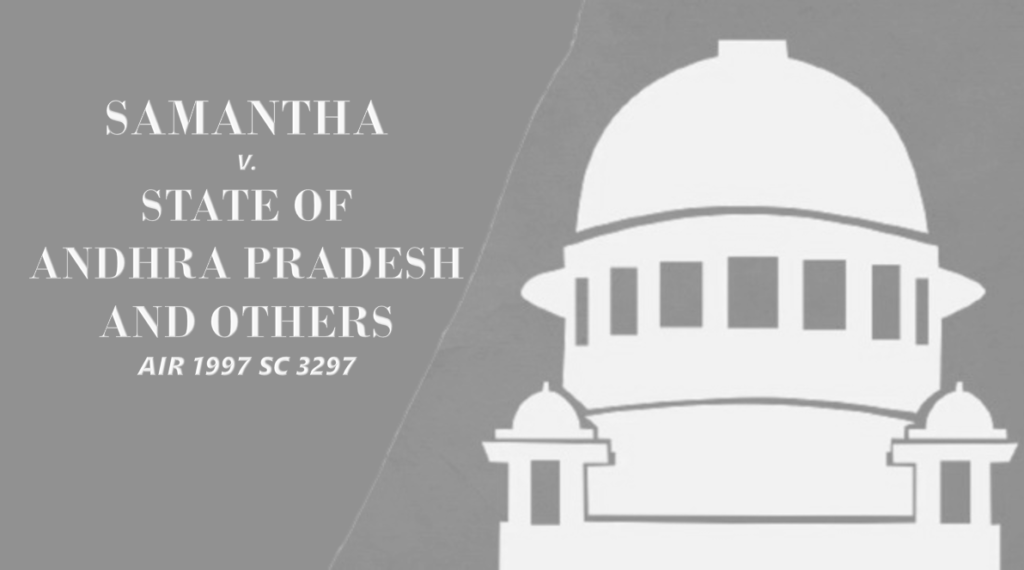
| NAME OF CASE | SAMANTHA V. STATE OF ANDHRA PRADESH AND OTHERS |
| CITATION | AIR 1997 SC 3297 |
| CASE TYPE | CIVIL APPEAL |
| DATE OF JUDGEMENT | 11TH JULY 1997 |
| APPELLANT | SAMANTHA |
| RESPONDENT | STATE OF ANDHRA PRADESH AND OTHERS |
| BENCH | K. RAMASWAMY, S. SAGHIR AHMAD, G.B. PATTANAIK |
| COURT | SUPREME COURT OF INDIA |
| CASE NUMBER | APPEAL (CIVIL) 4601- 02 OF 1997 |
FACTS OF THE CASE
- India is a country with too many tribes. This case is related to tribes and tribal areas of the country. ‘Samantha’ was a social group and appellant in this case which protected the land of tribal people in the above case. Borra Reserved Forest area consisting with 14 villages is a scheduled area in Ananthagiri Mandal in Visakhapatnam district of Andhra Pradesh. The state government transferred land of this area to the non – tribal persons.
- ‘Samantha’ filed a writ petition in Andhra Pradesh High court when Andhra Pradesh government was transferring land of tribal people for non – tribal for the purpose of mining. The division bench of High court held that Andhra Pradesh scheduled area Land Transfer Regulation amended by 1970 and the Mining Act of 1957 do not prohibit grant of mining leases of government land in the scheduled area to non – tribal. The appeal in Supreme Court was against the decision of Andhra Pradesh high court dated 28th April 1985.
- This appeal was against the power of state government for transferring land of tribal people for the non – tribal for mining.
ISSUE RAISED
- Whether the regulation would apply to transfer of government land to a non – tribal?
- Whether the government can transfer land of a tribal person to the non – tribal persons for the purpose of mining?
CONTENTIONS OF APPELLANT
- It was mentioned in appeals of Samantha that the Borra reserve forest area was a part of tribal people they have pattas and do cultivation on the land. In 1967, 14 villages were declared as Borra reserved forest. About 250 tribal families settled in 14 villages and have occupation in these villages.
- It was stated that agriculture is only way of livelihood of the tribal peoples or scheduled tribes who live in forest. The land was assuring them equality of status and dignity of person and means to economic and social justice and potent weapon of economic empowerment in social democracy. 90 percent of scheduled tribes live in forest and 95 percent are below from poverty line.
- Government has no right to transfer land of tribal people to non – tribal and the power of granting land to non – tribal is a violation of section 3 of the above mentioned resolution. Many cases had happened of exploitation with tribal before it also by government in the country said by appellant. Traditionally, tribal have absolute right on their culture and land.
- The word ‘person’ mentioned in the resolution should be understood as general purpose not only to natural persons.
CONTENTIONS OF RESPONDENT
- The section 3(1) of the resolution does not prohibit to transferring land of tribal to non – tribal. Resolution does not involve executive government from transferring land of scheduled tribes.
- The word ‘person’ mentioned in resolution does not involve government but only natural persons. The ordinary word used in a statute should be understood ordinary not a different or special meaning.
JUDGEMENT
- The word ‘person’ in the resolution does not cover state. State is not natural person and it includes only natural persons. A word mention in a statute must be understood as only an ordinary meaning not a different meaning. Appellant contentions were rejected by the court.
- The leases of respondent could not be said invalid on any ground and it was not violation of protected rights of Scheduled tribes. Appellant contentions were rejected.
- The court judgement was in the favour of respondent and the appeal was dismissed by the Supreme Court of India.
CONCLUSION
- The Andhra Pradesh government was transferring land of tribal to non – tribal for the use of mining. It was held that the appellant contentions were not sufficient to prove the violation of protected rights of tribal people.
- The judgement gave power of transferring land to non – tribal of tribal to government of Andhra Pradesh.
Written by: Diksha Gupta, NIMS School of Law, an intern under Legal Vidhiya




0 Comments